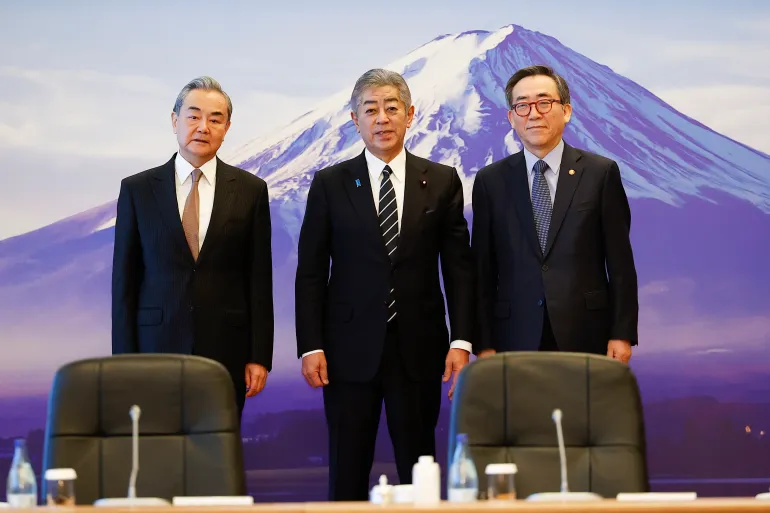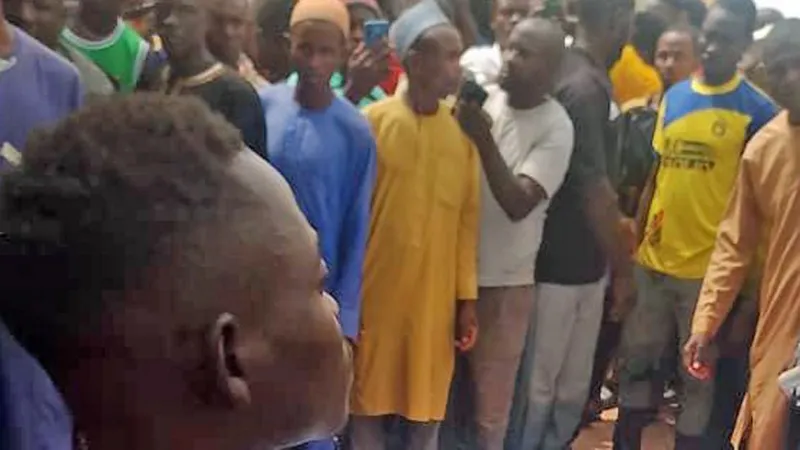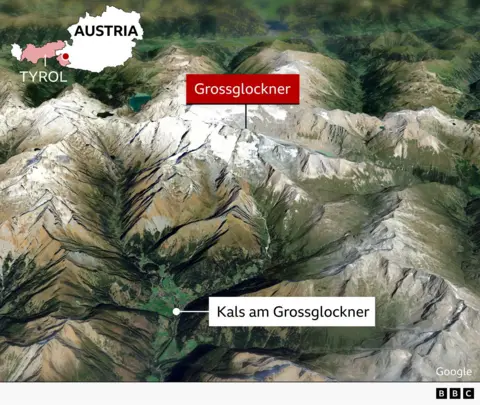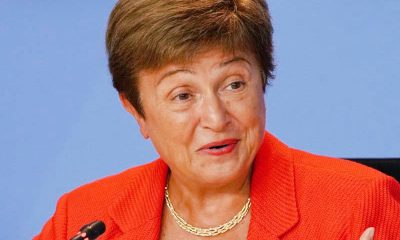Foreign News
Japan, S Korea, China meet to strengthen ties at ‘turning point in history’

The foreign ministers of Japan, South Korea and China have agreed on the need to seek common ground on East Asian security and economic issues amid escalating global uncertainty.
Japanese Foreign Minister Takeshi Iwaya, his Chinese counterpart Wang Yi and South Korea’s Cho Tae-yul have agreed to tackle multigenerational concerns to gain broader support for cooperation, Iwaya said in a joint news conference in Tokyo on Saturday.
The first gathering of the countries’ foreign ministers since 2023 comes as United States President Donald Trump upends decades-old alliances, potentially opening the door for China to forge closer ties to countries traditionally aligned with Washington.
“The international situation has become increasingly severe, and it is no exaggeration to say that we are at a turning point in history,” Iwaya said at the start of the meeting.
“In this context, it has become more important than ever to make efforts to overcome division and confrontation through dialogue and cooperation,” he said.
The three-way meeting is an accomplishment for Japan, which has historical and territorial disputes with both China and South Korea. An earlier trilateral meeting was held in South Korea last year.
China’s Wang said that as this year marks the 80th anniversary of the end of World War II, “only by sincerely reflecting on history can we better build the future”.
He said China supports strengthening cooperation, allowing the countries “to jointly resist risks” and promoting “mutual understanding” between their populations.
“Our three nations have a combined population of nearly 1.6 billion and an economic output exceeding $24 trillion. With our vast markets and great potential, we can exert significant influence,” Wang said.
China, he added, wants to resume free trade talks with its neighbours and expand membership of the 15-nation Regional Comprehensive Economic Partnership.

Reporting from Tokyo, Al Jazeera’s Fadi Salameh said the meetings aim to “build confidence between these three countries”.
“But still, there are so many differences and issues that divide the three countries,” Salameh said.
“Mr Wang Yi, the Chinese foreign minister, mentioned that the three countries – maybe targeting Japan with this point – should be honest about the historical issues that divided [them],” Salameh explained, referring to Yi’s mention of World War II and Japan’s war of aggression.
Beijing is at odds with Tokyo and Seoul on several other key issues, including its support of North Korea, its intensifying military activity around Taiwan, and its backing of Russia in its war with Ukraine.
US allies Japan and South Korea, which each host thousands of US soldiers, share Washington’s view that China – the world’s second-largest economy – poses a growing threat to regional security.
Cho said he had asked China in the meeting to help persuade North Korea to abandon its nuclear weapons.
“I also stressed that illegal military cooperation between Russia and North Korea should stop immediately, and that North Korea should not be rewarded for its wrongdoings in the course of bringing about the end of the war in Ukraine,” he added.
Iwaya is to meet separately with his Chinese and South Korean counterparts, including for the first high-level economic dialogue with Beijing in six years.
That meeting will include a discussion of a ban on Japanese seafood imports imposed by China after the release of wastewater from the destroyed Fukushima nuclear plant from 2023, Iwaya said this week.
[Aljazeera]
Foreign News
Trump’s Board of Peace members pledge $7bn in Gaza relief

Several countries which have signed up to Donald Trump’s Board of Peace have contributed more than $7bn (£5.2bn) towards a Gaza “relief package”, the US president has said.
Trump made the announcement during the first meeting of the organisation that many of US’s Western allies have refused to join, fearing the body originally meant to help end the war between Israel and Hamas may be intended to replace the UN.
The second phase of a US-brokered Gaza ceasefire plan includes the disarmament of Hamas and the reconstruction of Gaza.
It “looks like” Hamas would disarm, Trump told participants. However, there are few signs of the Palestinian group disarming. Gazans say it is extending its control over the Strip.
Speaking as the Board of Peace convened on Thursday, Israeli Prime Minister Benjamin Netanyahu said Israel had “agreed with our ally the US there will be no reconstruction of Gaza before the demilitarisation of Gaza”.
The war was triggered by the Hamas-led attack on southern Israel on 7 October 2023, in which about 1,200 people were killed and 251 others were taken hostage.
Israel responded to the attack by launching a military campaign in Gaza, during which more than 72,000 people have been killed, according to the territory’s Hamas-run health ministry.
The enclave’s economy is in ruins, with its buildings and infrastructure largely destroyed. The UN estimates the cost of damage at $70bn.
Countries including the UK, Canada, France and Germany have refused to join the Board of Peace that came into being last month.
In an effort to address concerns that the organisation was meant as a way of sidelining the UN, Trump told the board’s first meeting in Washington that “we’re going to be working with the United Nations very closely, we’re going to bring them back”.
Gaza, the US president said, was “no longer a hotbed of radicalism and terror”.
“And to end that, we have today, and I’m pleased to announce that Kazakhstan, Azerbaijan, UAE, Morocco, Bahrain, Qatar, Saudi Arabia, Uzbekistan, and Kuwait have all contributed more than $7bn toward the relief package”.
“Every dollar spent is an investment in stability,” he said, adding that the UN would contribute $2bn for humanitarian assistance, while football body Fifa would raise $75m for soccer-related projects in the Strip.
Nickolay Mladenov, a Bulgarian politician who has been given the title of high representative for Gaza as part of the board, said the process of recruiting a new transitional Palestinian police force had begun and “just in the first few hours we have 2,000 people who have applied”.
But both Israel and the US have insisted that the force is not drawn from the existing Hamas-controlled police without stringent vetting, nor do they want it simply made up of the security forces of the Palestinian Authority in the West Bank.
That means starting from scratch, and the task is daunting.
Mladenov has previously said the Palestinian police force must be the primary security agency in Gaza, assisted by the International Stabilisation Force (ISF), and not vice-versa.
According to the US plan, the ISF will work with Israel and Egypt, along with a newly trained and vetted Palestinian police force, to help secure border areas and ensure the process of permanently disarming non-state armed groups, including Hamas.
But Mladenov said there is little evidence such a force could yet oversee the disarmament of Hamas and other Palestinian factions.
Meanwhile, there was no indication at the meeting that Hamas was prepared to hand over its weapons, despite Trump’s combination of optimism and threat on this point.
So far, Hamas has publicly appeared to make handing over weapons contingent on – at least – Israeli withdrawal from Gaza.
Progress on this issue is critical because none of Trump’s proposals for reconstruction and governance can take place without a security force on the ground that has broad backing of the Palestinian population, given its role includes assuming a monopoly of force within Gaza.
The Washington meeting itself was characteristic of Trump’s approach to Israeli-Palestinian peace-making over his two terms – involving a future for Palestinians seen often through the lens of real-estate development and wealthy investor funding.
Meanwhile Israel’s leadership has been wary about some of Trump’s efforts, particularly the invitations to his board for Turkey and Qatar, whom Israel does not want to see take a prominent role in decisions on the future of Gaza.
Trump and his team have defended his unconventional approach saying it amounts to “new thinking” to try to solve the conflict.
However, Mladenov has warned that without rapid progress, Gaza will remain split into two territories, one under continuing Israeli occupation and the other under Hamas control – and also split from the West Bank, making a future independent state unviable and failing to secure either Palestinians or Israelis.
[BBC]
Foreign News
Suspected carbon-monoxide leak kills at least 30 miners in Nigeria, witnesses say

At least 33 miners have died in a suspected carbon-monoxide leak at a lead and zinc mine in central Nigeria’s Plateau state, witnesses have told the BBC.
The tragedy is believed to have happened just before sunrise at a site outside the town of Wase run by the mining company Solid Unity Nigeria Ltd.
Toxic gas is believed to have built up underground in poorly ventilated tunnels, causing the workers to collapse just before the end of their night shift.
They were discovered by those reporting to work in the morning – more than 20 other miners were rescued and rushed to hospital for treatment.
Security personnel have sealed off the mine, which is about 200km (124 miles) south-east of the state capital of Jos, as investigations get under way to find out the cause of the leak.
State officials are yet to visit the area and response efforts have reportedly been slow because of security concerns – armed criminal gangs, known locally as bandits, have been active there in recent years.
Safiyanu Haruna, one of the miners who found the bodies at the start of his shift, told the BBC that some of the miners who were underground survived and were taken to a hospital in Wase for treatment.
According to Haruna, the incident occurred at around 06:30 local time (05:30 GMT) killing 37 miners.
He said the miners had just finished performing their early morning Muslim prayers and had returned underground to finish their shift.
The Plateau state government has issued a statement saying that according to its preliminary investigation 33 miners were killed in a blast at the mine – but workers at the scene say this is not the case.
“It was carbon-monoxide gas that leaked and killed them,” Haruna said.
“There was no rescue for them at the time because those who were coming for the morning shift had yet to arrive,” he said.
“It is sad to lose 37 miners who were struggling to make ends meet. We’re disturbed by the incident.”
The victims, believed to be men aged between 20 and 40, were buried shortly afterwards in accordance with local tradition, another local resident told the BBC.
The news has devastated the mainly Muslim community.
Mining disasters occur relatively frequently in Nigeria.
Less than two years ago, dozens of gold miners died after being trapped underground when a pit collapsed in neighbouring Niger state.
Officials believe that incident was caused by torrential rains which had softened the soil.
The tragedy is likely to renew concerns over safety standards in Nigeria’s mining sector.
[BBC]
Foreign News
Climber on trial for leaving girlfriend to die on Austria’s highest mountain

More than a year after a 33-year-old woman froze to death on Austria’s highest mountain, her boyfriend goes on trial on Thursday accused of gross negligent manslaughter.
Kerstin G died of hypothermia on a mountain climbing trip to the Grossglockner that went horribly wrong. Her boyfriend is accused of leaving her unprotected and exhausted close to the summit in stormy conditions in the early hours of 19 January 2025, while he went to get help.
The trial has sparked interest and debate, not just in Austria but in mountain climbing communities far beyond its borders.
Prosecutors say that, as the more experienced climber, the man on trial was “the responsible guide for the tour” and failed to turn back or call for support in time to help his girlfriend.
Identified by Austrian media as Thomas P, he denies the charges and his lawyer, Karl Jelinek, has described the woman’s death as “a tragic accident.”
The tragedy unfolded after the couple began their climb of the 3,798m (12,460ft) Grossglockner.
Prosecutors accuse Thomas P of making mistakes from the outset and have published a list of 9 errors.
At stake is the question of when personal judgement and risk-taking become a matter of criminal liability. If the climber is found guilty it could mean “a paradigm shift for mountain sports”, says Austria’s Der Standard newspaper.
Key to the case is the charge by state prosecutors in Innsbruck that he was to be considered the “responsible guide for the tour”, as “unlike his girlfriend, he was already very experienced in high-altitude Alpine tours and had planned the tour”.

[BBC]
-

 Life style5 days ago
Life style5 days agoMarriot new GM Suranga
-

 Business4 days ago
Business4 days agoMinistry of Brands to launch Sri Lanka’s first off-price retail destination
-

 Features5 days ago
Features5 days agoMonks’ march, in America and Sri Lanka
-

 Features5 days ago
Features5 days agoThe Rise of Takaichi
-

 Features5 days ago
Features5 days agoWetlands of Sri Lanka:
-

 News5 days ago
News5 days agoThailand to recruit 10,000 Lankans under new labour pact
-

 News5 days ago
News5 days agoMassive Sangha confab to address alleged injustices against monks
-

 News3 days ago
News3 days agoIMF MD here













